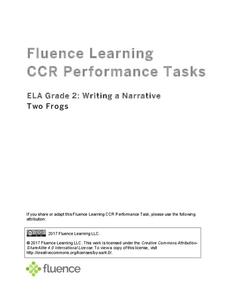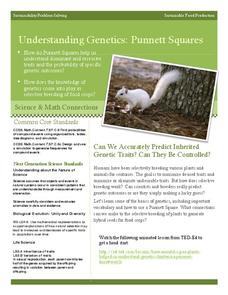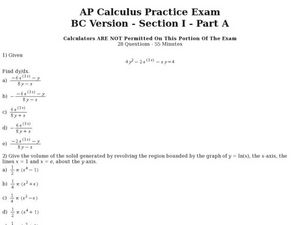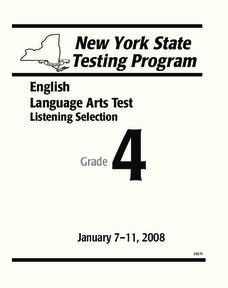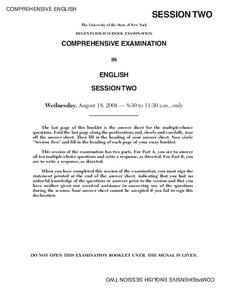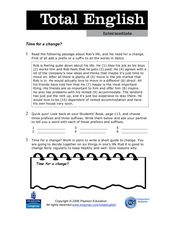Fluence Learning
Writing a Narrative: Two Frogs
Three options offer young writers the opportunity to read a short story, answer questions, and write a response. A handy language arts resource focuses on reading comprehension and analyziing the story's lesson: look before you leap.
Fluence Learning
Writing About Literature: Comparing and Contrasting Characters in Heidi
Scholars read excerpts from the story, Heidi, in a three-part assessment that focuses on comparing and contrasting characters. Each part contains three tasks that challenge learners to discuss, answer comprehension...
iCivics
The Fourth Branch: You!
Take time to remind your young learners of the valuable understanding that each branch of the United States government is really composed of other citizens. The reading material and worksheets of this resource cover the importance of...
Humanities Texas
Primary Source Worksheet: Text of “Prouder, Stronger, Better"
Political ads as primary source documents? But of course. Viewers analyze the strategies involved in the Republican Party's 1984 advertisement in support of Ronald Reagan's reelection.
Learning Zone Express
The Basics of Sewing
This resource is a stitch. Kids learn the basics of hand and machine sewing, how to sew on buttons, how to construct and repair clothing, and how to use patterns to create decorative ornaments.
E Reading Worksheets
Tone Worksheet 3
The interpretation of a poem often lies in the mind of its reader, especially when reading the tone. Focus on author's word choice, middle schoolers read four different poems and briefly state a perceived tone for each, along with the...
ReadWriteThink
Compare and Contrast
Read about the ways that different cultures set up homes with a set of reading activities. Learners read short paragraphs that cover one or more different ideas, and answer four questions about what they have read, including whether or...
Western Kentucky University
Understanding Genetics: Punnett Squares
Can scientists really predict genetic outcomes or are they simply making a lucky guess? Scholars first learn about Gregor Mendel and how to make Punnett squares. Then they extract DNA from a strawberry in a lab with included conclusion...
T. Smith Publishing
Subtracting From 10
For each row of ten animals, a certain number are crossed out as an example of subtraction. Little learners really grasp the concept as they work through the rows. The math sentence for each row is written below the graphics, and...
Curated OER
Calculus Practice BC
In this calculus worksheet, learners solve functions using the derivatives. They calculate the volume where the graph is revolving around the x-axis, a line, the y-axis and where x=e. There are 28 questions.
Curated OER
New York State Language Arts Test Grade 4
In this New York state language arts test learning exercise, 4th graders follow along to a listening selection and answer questions about it. Students follow along to a passage that is 1 1/2 pages.
Curated OER
Prime Factorization
In these prime factorization worksheets, students make a factor tree of the given numbers and then write the answers using exponential notation. Students then use multiplication to check their factoring work. Students evaluate the...
Curated OER
Parallel Structure
For this parallel structure worksheet, students must choose two people they know. Students follow the directions, then using the examples provided, write sentences about each person.
Curated OER
What is a Magnet?
In this magnet worksheet, students review what makes up matter, how electromagnets are made, and how compasses work. This worksheet has 6 fill in the blank and 2 short answer questions.
Curated OER
Regents High School Examination Comprehensive Examination in English Session Two (2004)
In this Regents High School Examination Comprehension Examination worksheet, students read an excerpt from a nonfiction work and a poem and answer reading comprehension questions. Students then write a unified essay using evidence...
Curated OER
Using a Flow Chart for Classification
In this flow chart instructional activity, students learn to use flow charts for classification of numbers, geometric shapes and animals. Students follow the directions and fill out flow charts to work out 20 answers. This is an online...
Curated OER
Electricity and Magnetism
For this electricity and magnetism worksheet, students will answer 17 questions about how electrons flow, how electric motors work, and the function of a transformer.
Curated OER
Native Americans: Thematic Timeline
In this Native American history worksheet, students follow the provided directions to create their own interactive timelines featuring resistance struggles of the tribes.
Curated OER
Adjectives and Adverbs Worksheet 1
In this grammar activity, students, after reviewing adjectives and adverbs, follow the instructions to several directives and then choose the appropriate adjective and adverbs for fifteen additional sentences.
Curated OER
Total English: Intermediate ELL Activity
For this ELL worksheet, students read a passage, adding a prefix or suffix to italicized words, then write prefixes and suffixes and work with a partner to create words using them. Students then write a short guide on "Things in life...
Curated OER
Mirror Writing
In this mirror writing worksheet, students follow the directions to decide which alphabet letters are symmetrical. Students use a mirror and a white light as they work in partners to trace simple shapes.
Curated OER
Nerves
In this nerves worksheet, students complete an experiment involving paper, straws, toothpicks, and more to test their nerves. Students follow 13 sets of directions.
Curated OER
The Excretory System
In this excretory system worksheet, learners describe the functions that the organs of the urinary system perform and what happens when the kidneys do not work properly. Students also name the excretory organs of the body and explain why...
Curated OER
Defining the Problem
In this problems worksheet, students use information they have collected about their campus and community to define one issue they are going to work on in depth. Students answer six questions about the problem they select, then complete...
